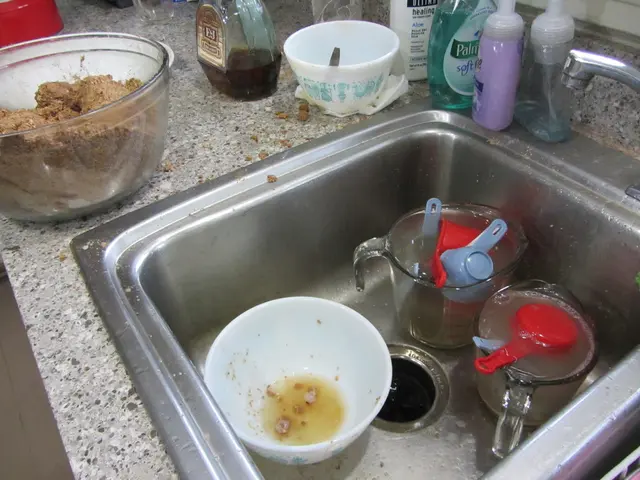Treatment Methods and Options for Indigestion in Children: Varieties and Substitutes
Functional dyspepsia (FD) and indigestion are common issues that can affect children. While these conditions may cause discomfort and distress, there are various treatment options available.
Functional Dyspepsia in Children
Functional dyspepsia is characterised by recurring or persistent upper mid-abdominal pain with no evident inflammatory, anatomic, metabolic, or neoplastic cause. Treatment for FD in children involves a multimodal approach, combining dietary modifications, lifestyle changes, medications, and alternative remedies.
Dietary Modifications
Avoiding certain foods and drinks that worsen symptoms is crucial. These may include acidic juices like orange juice and caffeine-containing liquids. Increasing adequate hydration with suitable liquids is also advised.
Lifestyle Changes
Stress management plays a significant role in managing FD symptoms. Relaxation techniques, deep breathing exercises, counseling, adequate sleep, and physical activity are emphasised. Personalised lifestyle management based on Eastern constitutional medicine (ECM) types has shown promise in improving FD symptoms.
Medications
Proton pump inhibitors (PPIs) are often the first-line acid suppression therapy, used for 4-8 weeks to reduce stomach acid. Other medications may include agents to calm the stomach or prevent vomiting, and medications to control anxiety if stress contributes to symptoms. Combination therapy with simethicone and probiotics (Bifidobacterium) has shown clinical efficacy in improving symptoms related to gastric motility and aerophagia.
Alternative Remedies
Alternative remedies like acupuncture, herbal medicine, and traditional constitutional approaches (ECM) have been explored and may provide benefit when personalised. However, scientific evidence remains preliminary, and further research is needed.
Indigestion in Children
Indigestion, or dyspepsia, is a general term that refers to pain or discomfort in the upper abdomen. Indigestion can be caused by various factors, including abnormal motility, infection, microbiome differences, visceral hypersensitivity, stress, and food sensitivity.
If indigestion happens due to GERD, doctors may recommend surgery if the child does not respond to conservative treatments. The standard surgical approach for GERD is laparoscopic surgery, a minimally invasive procedure that strengthens the lower sphincter between the stomach and esophagus.
Home Remedies and When to Seek Medical Advice
Parents or caregivers may try home remedies for managing their child's indigestion, such as peppermint oil, chamomile tea, ginger, lemon, honey, baking soda, licorice root, coriander, apple cider vinegar, fruits, cumin, mint leaves, aloe vera juice, and fennel seed. However, it's essential to consult a doctor if the child experiences serious symptoms, such as black stool, bloody vomit, difficulty swallowing, painful swallowing, weight loss, pain that wakes the child from sleep, shortness of breath, sweating, yellowish skin or eyes (jaundice), persistent or recurrent fever higher than 101°F, or 38°C.
In summary, a multimodal approach, including diet and lifestyle modifications, medications, and integrative methods, is crucial in treating functional dyspepsia and indigestion in children. Individualised care with provider guidance is essential to address symptoms and improve quality of life. If home remedies and lifestyle changes do not work or the child is experiencing more severe symptoms, it's crucial to speak with a doctor for further treatment.
Sources:
- Drugs.com (2025)
- Frontiers in Medicine case report (2025)
- Frontiers in Pediatrics study (2025)
- DrOracle.ai article (2025)
- Functional dyspepsia (FD), characterized by recurring upper mid-abdominal pain, can affect children and requires a multimodal treatment approach.
- Dietary modifications for FD in children involve avoiding acidic juices and caffeine, while increasing hydration with suitable liquids.
- Lifestyle changes for managing FD symptoms include stress management techniques, balanced sleep, physical activity, and personalized lifestyle management based on Eastern constitutional medicine (ECM) types.
- Proton pump inhibitors (PPIs) are commonly used as first-line acid suppression therapy for FD, but other medications may be necessary for stomach calming, vomiting prevention, and anxiety control.
- Alternative remedies for FD, such as acupuncture, herbal medicine, and traditional constitutional approaches (ECM), may provide benefit, but require more scientific research.
- Indigestion in children can be caused by various factors, including GERD, and home remedies such as peppermint oil, chamomile tea, ginger, and apple cider vinegar may be tried, but serious symptoms like black stool, difficulty swallowing, or recurrent fever should prompt a medical consultation.
- In treating both functional dyspepsia and indigestion, individualized care led by healthcare providers is essential to address symptoms, improve quality of life, and determine when more invasive methods like surgery may be necessary.





